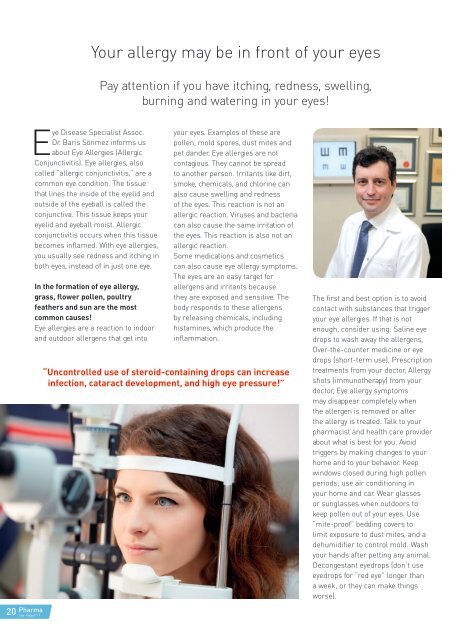Pharma Turkey Dergisi Temmuz- Ağustos 2017 Sayısı
You also want an ePaper? Increase the reach of your titles
YUMPU automatically turns print PDFs into web optimized ePapers that Google loves.
Your allergy may be in front of your eyes<br />
Pay attention if you have itching, redness, swelling,<br />
burning and watering in your eyes!<br />
20 <strong>Pharma</strong><br />
July- August ‘17<br />
Eye Disease Specialist Assoc.<br />
Dr. Baris Sönmez informs us<br />
about Eye Allergies (Allergic<br />
Conjunctivitis). Eye allergies, also<br />
called “allergic conjunctivitis,” are a<br />
common eye condition. The tissue<br />
that lines the inside of the eyelid and<br />
outside of the eyeball is called the<br />
conjunctiva. This tissue keeps your<br />
eyelid and eyeball moist. Allergic<br />
conjunctivitis occurs when this tissue<br />
becomes inflamed. With eye allergies,<br />
you usually see redness and itching in<br />
both eyes, instead of in just one eye.<br />
In the formation of eye allergy,<br />
grass, flower pollen, poultry<br />
feathers and sun are the most<br />
common causes!<br />
Eye allergies are a reaction to indoor<br />
and outdoor allergens that get into<br />
your eyes. Examples of these are<br />
pollen, mold spores, dust mites and<br />
pet dander. Eye allergies are not<br />
contagious. They cannot be spread<br />
to another person. Irritants like dirt,<br />
smoke, chemicals, and chlorine can<br />
also cause swelling and redness<br />
of the eyes. This reaction is not an<br />
allergic reaction. Viruses and bacteria<br />
can also cause the same irritation of<br />
the eyes. This reaction is also not an<br />
allergic reaction.<br />
Some medications and cosmetics<br />
can also cause eye allergy symptoms.<br />
The eyes are an easy target for<br />
allergens and irritants because<br />
they are exposed and sensitive. The<br />
body responds to these allergens<br />
by releasing chemicals, including<br />
histamines, which produce the<br />
inflammation.<br />
“Uncontrolled use of steroid-containing drops can increase<br />
infection, cataract development, and high eye pressure!”<br />
The first and best option is to avoid<br />
contact with substances that trigger<br />
your eye allergies. If that is not<br />
enough, consider using: Saline eye<br />
drops to wash away the allergens,<br />
Over-the-counter medicine or eye<br />
drops (short-term use), Prescription<br />
treatments from your doctor, Allergy<br />
shots (immunotherapy) from your<br />
doctor, Eye allergy symptoms<br />
may disappear completely when<br />
the allergen is removed or after<br />
the allergy is treated. Talk to your<br />
pharmacist and health care provider<br />
about what is best for you. Avoid<br />
triggers by making changes to your<br />
home and to your behavior. Keep<br />
windows closed during high pollen<br />
periods; use air conditioning in<br />
your home and car. Wear glasses<br />
or sunglasses when outdoors to<br />
keep pollen out of your eyes. Use<br />
“mite-proof” bedding covers to<br />
limit exposure to dust mites, and a<br />
dehumidifier to control mold. Wash<br />
your hands after petting any animal.<br />
Decongestant eyedrops (don’t use<br />
eyedrops for “red eye” longer than<br />
a week, or they can make things<br />
worse).<br />
C<br />
M<br />
Y<br />
CM<br />
MY<br />
CY<br />
CMY<br />
K

















